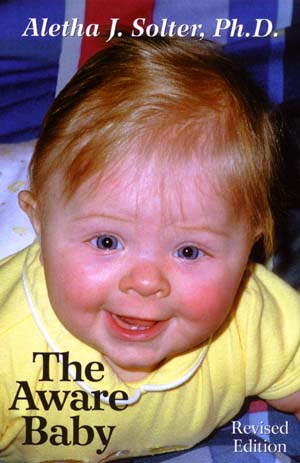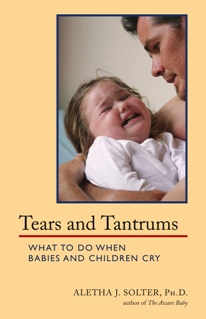Four-month-old wakes up frequently at night
by Aletha Solter, Ph.D.
Question:
My four-month-old daughter takes a pacifier to bed with her. Sometimes during the night she awakens and has spit the pacifier out, and cries out until we come and replace the pacifier in her mouth. Then she calms and goes back to sleep. It is not a problem during naps or in the early evening when we are still awake, but after we go to bed there have been nights that this occurs as much as four times at various hours. I am wondering what route to take with this - whether to start letting her "cry it out" and see if she will eventually fall asleep, or if we should endure this until she learns to replace the pacifier herself. Do you have any suggestions? Also, up to now we have been rocking her to sleep. She is the type of baby that appears very alert but will be crying from tiredness and seems to need help relaxing. We go through the settling down routine of wrapping in her blanket (she still likes that), getting the pacifier, and sitting with mom or dad but she doesn't really calm down and become drowsy in appearance until she has been rocked for awhile. I am starting to put her down after rocking until she becomes sleepy but before she falls asleep completely so that she will fall asleep in her crib. Is it recommended to stop rocking altogether, and if so, how do you suggest we get to that point from where we are now? It's not that I have a problem with rocking her, but I want her to learn to put herself to sleep.
Answer:
At four months of age, your baby may still need one or two night feedings, especially if she is breast-fed, or if she is small for her age. So I would recommend, first of all, checking for hunger.
Another cause of night awakenings is a need for closeness. A four-month-old is too young to be left to fall asleep alone. Babies need physical closeness while falling asleep. You will not spoil her by holding her every evening until she falls asleep in your arms. I also urge you to be open to the idea of letting your baby sleep with you or near you. Babies benefit from physical closeness at night, or at least knowing that their parents are within arm's reach. Meeting this need may help your baby sleep better. If you prefer not to co-sleep with your daughter, I recommend that you hold her frequently during the day, in addition to holding her in the evenings until she falls asleep. It is also important always go to her in the night if she wakes up crying. I do not recommend letting babies "cry it out" alone.
A third possible cause of night awakenings is pent-up stress and tension. Babies accumulate stress resulting from daily frustrations and overstimulation, and this can cause them to awaken frequently at night. The natural remedy for releasing stress is through crying. Research has shown that stress hormones are excreted through tears and that crying lowers blood pressure and heart rate. It helps to restore the body's physiological balance (homeostasis) following stress or trauma. Babies who had a difficult birth tend to cry more than babies who had an easier birth, and they also awaken more frequently at night crying well past the age of needing milk at night. Allowing these babies to cry in arms at bedtime can allow them to release stress before falling asleep.
You mention that your baby cries from tiredness. Babies don't cry from tiredness, but from pent-up stress (or immediate needs). However, when babies are getting tired, it becomes more difficult to distract them from crying, so it looks as if they are crying from tiredness or (fighting( sleep. In reality, they are probably releasing stress by crying so they can relax and fall asleep. I recommend holding your baby while she is crying, but without distracting her. The way you put your daughter to sleep may be interfering with this natural stress-release mechanism. When you put something in your baby's mouth (such as a pacifier), or when you distract and soothe your baby by rocking, this can help her fall asleep, but it won't work for very long because it only postpones the crying. This could be the reason why your daughter wakes up frequently at night. Perhaps she is trying to complete the crying that she needs to do.
I recommend that you stop using a pacifier and try to accept your daughter's bedtime crying as a healthy tension-release mechanism rather than try to stop it. This does not mean ignoring her when she cries. Babies should never be left to cry alone. You can hold her lovingly at bedtime while she cries without putting anything in her mouth and without trying to distract her by movements or sounds. (I am assuming that she has recently been fed and is not hungry.) Let her cry in your arms as long as she needs to. Treat her as you yourself would want to be treated after a hard day, when you may need a shoulder to cry on. By adopting this in-arms crying approach, you will establish a good listening relationship with your baby. As she grows older, she will know that she can count on you to listen and accept her feelings.
After your daughter has cried in your arms, she will probably fall into a deep sleep, and you will then be able to put her down. (It may take an hour or more of crying the first few times you try this.) Parents who use this approach find that their babies soon begin sleeping longer stretches at night without waking up. This is accomplished without ever leaving their babies to cry alone.
About Aletha Solter:
Aletha Solter, PhD, is a developmental psychologist, international speaker, consultant, and founder of the Aware Parenting Institute. Her books have been translated into many languages, and she is recognized internationally as an expert on attachment, trauma, and non-punitive discipline.
Aware Parenting is a philosophy of child-rearing that has the potential to change the world. Based on cutting-edge research and insights in child development, Aware Parenting questions most traditional assumptions about raising children, and proposes a new approach that can profoundly shift a parent's relationship with his or her child. Parents who follow this approach raise children who are bright, compassionate, competent, nonviolent, and drug free.
For more information about babies, crying, and sleep, see Aletha Solter's books, The Aware Baby, and Tears and Tantrums.
Related articles:

